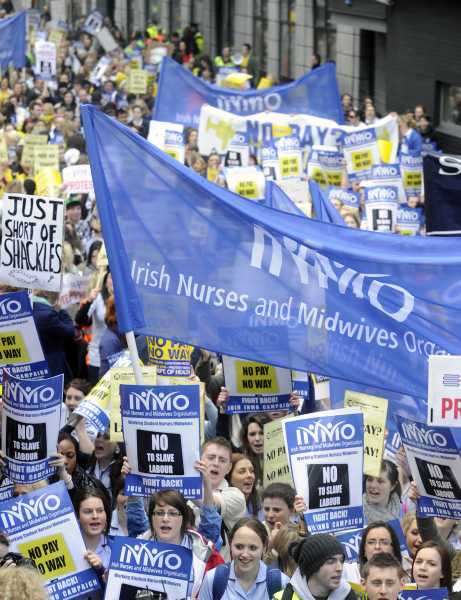9 November 2011
Opinion : IT’S THE HEALTH SERVICE, STUPID!, By Dave Hughes, INMO Dep Gen Sec
“IT’S THE ECONOMY, stupid” is a phrase used by Bill Clinton to explain why government and politicians were able to maintain themselves in office regardless of their performance on other issues. It is by now a well-worn cliché, particularly by our national broadcast media who are obsessed, it seems, with the importance of the economy at the expense of everything else in society, including our humanity. It seems the current government, in spite of its promises prior to the election, are equally caught up with the same notion that “it’s the economy, stupid”. But values change in society and populations recognise different priorities in different eras.
For the Irish population at the moment, the economy is indeed a major issue but it is slowly emerging that there are other even more pressing issues for vast numbers of people in our community. High among those are unemployment and the need for proper health services. By the time we get to the next general election perhaps the phrase will have changed to “it’s the health service, stupid” as an explanation as to why the current government is re-elected or not.
This year’s census revealed that there are some 350,000 more people living in Ireland this year than in 2006. HSE Chief Executive Officer Cathal Magee, in a recent presentation to a seminar at the IPA, stated that the current population is 17% higher than it was in 2002 and that, contrary to the widely propagated view, Irish spending on our health services is below most other developed nations and includes welfare services which are not included in the expenditure for other countries.
He further indicated that the number of in-patient discharges and day-case discharges has increased year on year and that this trend has continued, in spite of major staff reductions over the last three years and a drop in the HSE’s budget of more than €1billion in that period. He omitted mentioning that this was also achieved in spite of the fact that 2,317 beds are currently closed in our services. The correlation between the increase in population, decrease in health spending, staffing and beds and the current chronic overcrowding in our Accident & Emergency departments is, we suggest, quite obvious and the major advances in productivity and the reduction in length of patient stay are swallowed up by the extra demand on the services. It is little wonder, therefore, that many health professionals are left demoralised with an ever-increasing workload and an inability to respond to it.
Mr Magee also informed his audience that, contrary to popular opinion, the Irish health spending per head of population is not higher than other developed countries. He outlined that Irish health spending also includes social expenditure, which inflates its apparent cost, but even with that inflation falls less than Sweden, France, Holland, Denmark and the Netherlands and is in line with that of Britain and the North.
So is it wise for government and media to continue the pretence that we are spending too much on our health care when the health spending, even as a percentage of GDP, has fallen in spite of the fall in the GDP itself?
Has the HSE accepted an impossible mandate in attempting to provide more services to more people with less staff and less money?
The International Council of Nurses, following a meeting in Sweden this year, expressed its alarm that austerity measures promoted in response to the current worldwide recession are resulting in ill-advised reductions in essential health services that are impacting on the quantity and quality of patient care delivered. They recommend that governments immediately develop and implement effective health workforce planning, education, training and retention strategies to sustain service delivery and nursing contribution. Budget planning and decision making, they say, must be driven by population healthcare needs and safe quality care.
Our current government have a stock answer for every question which is ‘there is no money’.
Others believe there are choices between bank bail-outs and the health of the nation.
Can government continue to ignore the evidence of chronic overcrowding as we face into the winter and the warnings coming form the nursing workforce, particularly those in Limerick, about the appalling consequence for patients? Can government and media continue to blame staff when the evidence is they are treating more patients with less money and fewer people than ever before?
The consequence of governments taking the austerity approach to the National Health Service in Britain and the North has produced appalling results for patients. Austerity drives of the late 1990s and early 2000s and government obsession with performance indicators and targets in that country led to managements chasing those indicators and targets at the expense of quality patient care. The consequence was large numbers of unnecessary deaths in public hospitals. The evidence of that outcome is documented in the reports of the British Health Care Commission. Its reports on CD outbreaks in Stoke Mandeville and the Maidstone and Turnbridge Wells NHS Trusts make chilling reading of what happens even where hospitals have met their performance indicators and targets but have taken their eye off the quality issue.
It is unfortunate that current Irish policies, like so many times in the past, are simply aping that which has been tried and failed for our nearest neighbour. There is no reason to think that if continued for long enough they will not have the same consequences in this country. No government can afford to ignore the needs for patients and their cries for help through nurses and midwives who are their advocates. No true value can be got from the health service without recognising that the quality of care delivered is directly related to the quality and quantity of staff with the nurse managers to be accountable for it. The current strategy of refusing to fill any nurse or midwife vacancies, regardless of the level, whether director or staff nurse or midwife, may have catastrophic consequences for patients. The Irish public will not stand for that and the government who ignores its nurses and midwives may well learn that “it’s the health service, stupid” when they face that public.
Follow us on Facebook
An Phoblacht on Twitter
Uncomfortable Conversations

An initiative for dialogue
for reconciliation
— — — — — — —
Contributions from key figures in the churches, academia and wider civic society as well as senior republican figures






